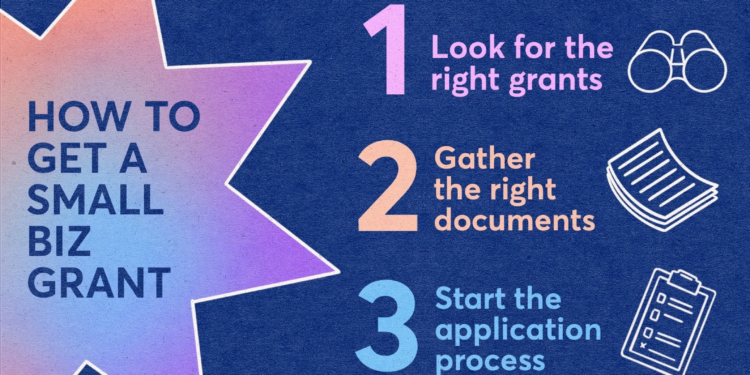Small Business Grants are essential financial resources that can help emerging entrepreneurs secure the funding needed to launch and grow their ventures. These grants, often provided by the government and various nonprofit organizations, offer a unique opportunity for business financing without the burden of repayment, making them highly sought after compared to traditional small business loans. Many aspiring business owners may feel overwhelmed by the various options available, but understanding the array of grants for entrepreneurs can simplify this process. From specialized programs aimed at specific demographics to general grants that support innovative ideas, small business grants can be a game-changer for those looking to establish a stable foundation for their operations. Accessing these grants can provide vital financial support and foster growth in communities across the nation.
In today’s entrepreneurial landscape, financial help for startups can often take the form of funding grants tailored specifically for small businesses. These various forms of funding, sometimes referred to as government grants or financial assistance programs, play a crucial role in fostering innovation and creativity among new business owners. Aspiring entrepreneurs can explore multiple financing options, including small business loans, to complement their growth strategies. Additionally, specialized grants focused on diverse communities and unique business needs provide further avenues for support. By tapping into these resources, business owners can significantly enhance their chances of success and stability.
Understanding Small Business Grants
Small business grants are a significant source of funding for entrepreneurs, providing financial support without the burden of repayment. These grants can help businesses cover expenses such as equipment, operational costs, and marketing efforts. Unlike traditional small business loans, which require regular payments and interest, grants are typically awarded by government entities, nonprofits, or private foundations interested in fostering economic growth. By exploring various grant opportunities, business owners can access essential resources to jumpstart their business idea or expand existing operations.
Key sources for small business grants include government resources such as Grants.gov and local initiatives aimed at supporting community development. Entrepreneurs should be aware that competitions are often stiff, as grants are highly sought after. Thus, it is crucial to present a compelling proposal that clearly outlines the purpose of the funding, the potential impact on the community, and how the grant will be utilized. Approaching the application process with thorough research and strategic planning can significantly increase the chances of securing funds.
Exploring Business Financing Options
In addition to grants, various business financing options are available for entrepreneurs. Small business loans serve as a primary method for securing capital needed to start or expand a business. Financial institutions and online lenders often offer diverse loan products, tailored to specific needs, whether for equipment purchases or working capital. However, business loans typically require a solid credit score and a reliable business plan, making the application process detailed and somewhat demanding.
Another avenue for business financing is through venture capital, where investors provide funds in exchange for ownership equity or convertible debt. This option is particularly popular among startups looking for not just funds but mentorship and industry connections as well. Furthermore, crowdfunding platforms have emerged as innovative ways for entrepreneurs to secure funds while simultaneously building a customer base. Understanding these diverse funding avenues is essential for any business owner looking to finance their venture.
The Advantage of Government Grants for Entrepreneurs
Government grants offer numerous advantages for entrepreneurs, one of the most crucial being the lack of required repayment. These grants can specifically target various demographics or industries, providing financial support that can be transformative for new businesses. For instance, the CDFI Fund and NIH Grants focus on underserved communities, emphasizing the inclusion of diverse entrepreneurs in the market. By actively seeking out these grants, business owners can receive financial support tailored to their specific needs and challenges.
While government grants might come with specific eligibility criteria and stipulations, they generally aim to encourage innovation and community development. Many programs also offer additional resources such as mentorship and business development workshops. By leveraging these opportunities, entrepreneurs not only gain essential funds but also valuable insights that can foster sustained business growth. Ultimately, understanding the landscape of government grants can equip small business owners with the tools needed to navigate their entrepreneurial journey successfully.
Diversity-Focused Grant Programs
Diversity-focused grant programs are instrumental in ensuring equitable access to funding for entrepreneurs from underrepresented communities. Various organizations create specific grants targeted at women, minority, and disabled entrepreneurs, helping these business owners to overcome systemic barriers in access to capital. For instance, the Amber Grant Foundation provides financial support exclusively to women entrepreneurs, while the Latino Economic Development Center focuses on Latino-owned businesses seeking assistance in their growth journey.
In addition to offering monetary support, these grants often include resources like mentorship programs, networking opportunities, and workshops aimed at enhancing business acumen. By empowering diverse business owners, these programs foster innovation and community engagement, making the entrepreneurial landscape richer and more varied. The impact of diversity-focused grants extends beyond individual businesses, contributing to broader economic development and sustainability.
Successful Strategies for Grant Applications
Navigating the grant application process can be daunting, but certain strategies can significantly enhance the likelihood of success. First and foremost, thoroughly researching each grant opportunity is crucial. Understanding the specific goals of the grant and tailoring your application to meet those objectives can set your proposal apart. Highlighting the potential impact of your business in the community, along with clear financial projections and outcomes, will strengthen your case for funding.
Additionally, seeking feedback from mentors or other entrepreneurs who have successfully received grants can provide invaluable insights. Many resources, such as Small Business Development Centers (SBDCs), offer workshops on grant writing and proposal preparation. Utilizing these resources can help refine your application and increase your understanding of what funders are looking for, ultimately boosting your chances of securing that much-needed financial support.
Leveraging Small Business Development Programs
Small business development programs are designed to provide entrepreneurs with the necessary tools, resources, and support to grow their businesses effectively. These programs often include workshops, mentoring, and networking opportunities that are essential for navigating the complexities of starting and managing a business. Many such programs are government-sponsored, offering various grants and resources tailored to specific demographics or industries.
By participating in small business development programs, entrepreneurs can gain access to vital information about securing funding, including small business loans and government grants. Additionally, these programs can help business owners develop a strategic plan for growth, find potential customers, and connect with fellow entrepreneurs. In essence, leveraging these development programs can equip business owners with the knowledge and skills needed to enhance their operations and increase their chances of success.
Finding Resources for Financial Support
Identifying resources for financial support is a critical step for small business owners seeking to sustain and expand their operations. Beyond traditional small business loans, countless potential funding sources exist, including grants, crowdfunding, and investment from venture capitalists. Understanding how to navigate these different options is essential for building a solid financial foundation for your business.
Entrepreneurs can access a variety of online databases and platforms that list available grants and financing options. Local Small Business Development Centers (SBDCs) and nonprofit organizations often provide free resources and workshops that teach business owners how to apply for funding, write a business plan, and manage finances effectively. By actively seeking out these resources, entrepreneurs can position themselves for success and create sustainable funding strategies.
Evaluating Eligibility for Different Grants
When applying for grants, understanding eligibility requirements is paramount. Each grant has specific criteria, including business type, geographic location, and demographic considerations. For instance, certain grants cater exclusively to women-owned businesses, while others may focus on tech startups or companies serving underprivileged communities. Carefully reviewing these mandates can help entrepreneurs identify the grants they are qualified for and avoid wasting valuable time on applications that are unlikely to succeed.
Moreover, documenting and preparing all necessary materials beforehand is essential for facilitating a smooth application process. This includes gathering financial statements, business plans, and any previous funding received. Keeping a checklist of requirements for each grant can help ensure that all materials are complete and submitted in a timely fashion. By evaluating eligibility and preparing thoroughly, entrepreneurs can optimize their chances of securing grants that will significantly enhance their business growth.
Staying Informed on Funding Opportunities
Staying informed about funding opportunities is crucial for entrepreneurs looking to grow their businesses over time. Subscribing to newsletters, following industry blogs, and participating in local business networking events are excellent ways to learn about new grants, loans, and financial programs as they become available. Staying connected with relevant associations and organizations can also provide insights into upcoming funding opportunities and changes in grant regulations.
Additionally, regularly checking databases such as Grants.gov and local government websites will keep entrepreneurs updated on new offerings. Many platforms now offer alerts for suitable grants based on predetermined criteria, making it easier to find applicable funding opportunities tailored to specific business needs. By actively seeking and remaining engaged in the funding landscape, entrepreneurs can position themselves to seize advantageous opportunities as they arise.
Frequently Asked Questions
What are small business grants and how can they benefit my business?
Small business grants are funds provided by government agencies, nonprofit organizations, and corporations that do not require repayment. They offer vital financial support to entrepreneurs for various purposes, such as startup costs, expansion, or specific projects. This financial assistance can significantly reduce the burden of debt that often accompanies business loans.
Where can I find government grants for small businesses?
You can start your search for government grants for small businesses at Grants.gov, a comprehensive federal resource that lists available grants across different sectors. Additionally, check with local and state agencies, as they often provide grants tailored for specific community needs.
What types of financial support are available for small businesses?
Small businesses can access various types of financial support, including government grants, small business loans, and corporate sponsorships. Each type of funding has its own eligibility criteria and application process, making it essential for entrepreneurs to research thoroughly their options.
Are there specific grants for women entrepreneurs?
Yes, there are several grants specifically targeting women entrepreneurs, such as the Amber Grant Foundation and the Fearless Fund. These programs focus on empowering women-owned businesses through financial support, mentorship, and resources tailored to their unique challenges.
How do I apply for small business loans or grants?
To apply for small business loans or grants, start by researching available opportunities. Prepare a solid business plan, gather necessary documentation, and carefully review the eligibility requirements for each program. Many organizations provide guidance through the application process, so utilize those resources for better chances of success.
What are some resources for small business grants for veterans?
Veterans can access specific small business grants and programs designed for them, such as the Service-Disabled Veteran-Owned Program or the 8(a) Business Development Program. Networking with local Veteran Affairs offices or organizations focused on veteran entrepreneurship can also provide valuable guidance and support.
Are there grants for entrepreneurs with disabilities?
Yes, there are dedicated grants and resources for entrepreneurs with disabilities. Programs like 2Gether International and various Assistive Technology Loans cater to the unique needs of disabled business owners, providing both funding and support.
How often are small business grants updated?
The list of available small business grants is frequently updated by organizations such as CO—, which regularly provides updated information on grants, loans, and business programs. Subscribing to newsletters from these sources can help you stay informed about new opportunities.
What is the difference between a small business grant and a loan?
The primary difference between a small business grant and a loan is that grants do not require repayment, while loans must be paid back with interest. Grants serve as financial support for specific initiatives or needs, whereas loans generally provide funding that must be repaid over time.
How can I get personalized support in my search for small business grants?
For personalized support in your search for small business grants, consider consulting your local Small Business Development Centers (SBDCs). They offer tailored advice, funding resources, and assistance with grant applications to help you navigate the financial support landscape.
| Grant Type | Examples | Purpose |
|---|---|---|
| Government Grants | CDFI Fund, Illinois Infrastructure Grants | Supports community development and small business research. |
| Business Development Programs | Service-Disabled Veteran-Owned Program, 8(a) Business Development Program | Provides guidance and financial support for specific business owners. |
| General Small Business Grants | Awesome Foundation Grants, Square Cornerstone Grant | Offers funding for innovative projects and general business needs. |
| Diversity-Focused Programs | Amber Grant Foundation, Fearless Fund | Supports businesses led by underrepresented groups. |
| Resources for Entrepreneurs with Disabilities | 2Gether International, Assistive Technology Loans | Empowers entrepreneurs with disabilities through financial assistance. |
Summary
Small Business Grants are essential resources for entrepreneurs looking to build or expand their businesses without incurring debt. With a variety of grants available from government bodies, nonprofit organizations, and corporate sponsors, small business owners can find financial support tailored to their unique needs. Understanding the different types of grants—whether for general business needs, specific demographics, or business development programs—can help entrepreneurs choose the right funding options. Additionally, connecting with local Small Business Development Centers can provide personalized guidance in the grant application process, ensuring that applicants maximize their chances of success.
Introducing Autowp, your ultimate solution for creating high-quality, engaging content effortlessly with our powerful AI content generator and AI content creator plugin designed specifically for WordPress. Streamline your content production process and captivate your audience with tailored articles, blog posts, and descriptions in just a few clicks. Elevate your website’s presence and enhance your SEO rankings by utilizing the intelligent features of Autowp!
To remove this promotional paragraph, upgrade to Autowp Premium membership.












